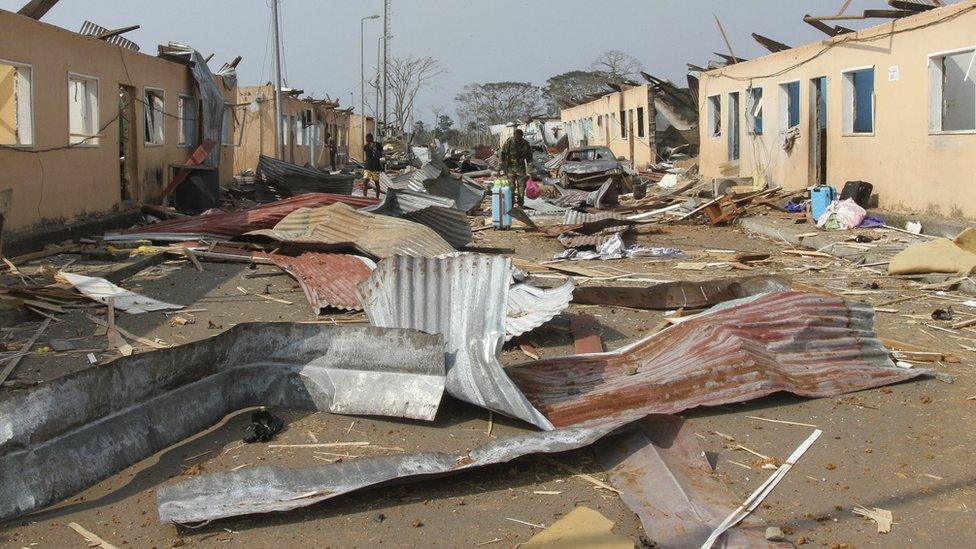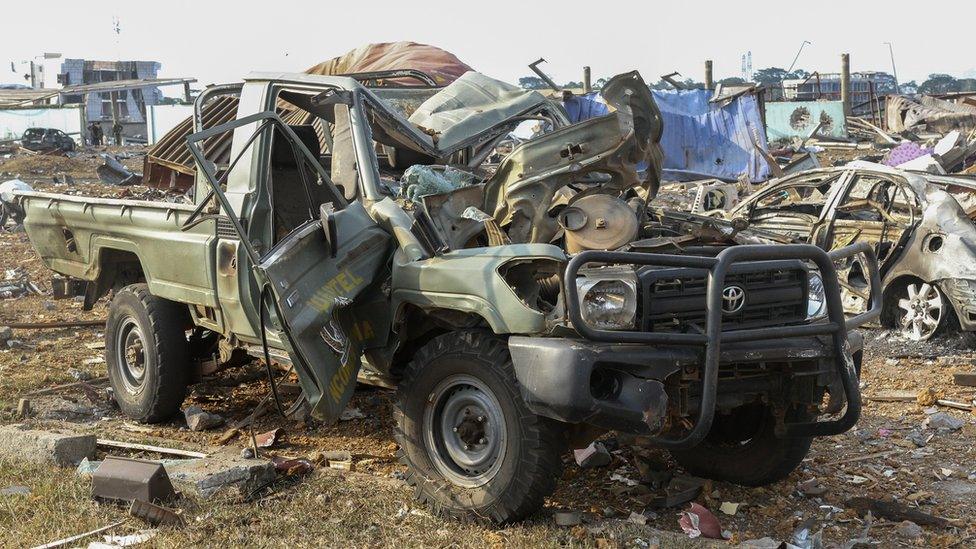Bata explosion: Equatorial Guinea death toll rises to 98
- Published
State television showed widespread destruction following the blasts
The death toll from a series of explosions in Equatorial Guinea on Sunday has risen to 98, officials say.
Another 615 people were injured, with 299 still in hospital.
The blasts hit a military base in the country's main city, Bata. Officials blame badly stored dynamite along with stubble burning by nearby farmers.
The death toll, updated after volunteers spent Monday searching the wreckage for bodies, is more than triple the initial estimate of 31.
Three young children were found alive and taken to hospital.
Almost all buildings and homes in the city suffered "huge damage", President Teodoro Obiang Nguema said.
In a statement, President Obiang Nguema said the blasts had been caused "by the negligence of a unit charged with the care and protection of stores of dynamite and explosives, external" at the Nkoantoma military base.

Volunteers searched the rubble for bodies on Monday
He said the base had "caught fire due to neighbouring farmers clearing farming land by setting it alight, leading to the explosion". The president has appealed for international aid.
In a series of tweets, the health ministry called for volunteer health workers to go to Bata Regional Hospital and for urgent blood donations. The ministry said mental health teams were also being deployed to help victims.
Allow X content?
This article contains content provided by X. We ask for your permission before anything is loaded, as they may be using cookies and other technologies. You may want to read X’s cookie policy, external and privacy policy, external before accepting. To view this content choose ‘accept and continue’.

Some hospitals have been overwhelmed by the number of patients admitted, state TV reported. It broadcast images of wounded people lying on the floor of a crowded hospital.

Hundreds of people are still in hospital
Video of the aftermath of the explosions showed a chaotic scene with distressed people fleeing as smoke drifted over the area.
One resident told AFP news agency: "We haven't slept all night. The houses were burning all night long and we kept hearing small explosions."
Another described how his uncle had found the burned bodies of five members of his family.
The only opposition party, the CPDS, described the blasts as "the greatest humanitarian catastrophe in the history of Equatorial Guinea" and called on Spain, France and the United States to send aid, including rescue teams, medical staff and medicines.
Spanish Foreign Minister Arancha Gonzalez tweeted on Monday that Spain would "proceed with the immediate dispatch of a shipment of humanitarian aid".

Five things about Equatorial Guinea:
Africa's only Spanish-speaking country, it gained independence from Spain in 1968
It is divided between the mainland and an island, where the capital, Malabo, is located
President Obiang Nguema, in power since 1979, has been repeatedly accused of human rights abuses
Western officials and NGOs have also accused the president and his family of massive corruption
Despite riches in oil and gas, 76% of its 1.5 million people live in poverty, according to the UN and World Bank.


Related topics
- Published8 May 2018